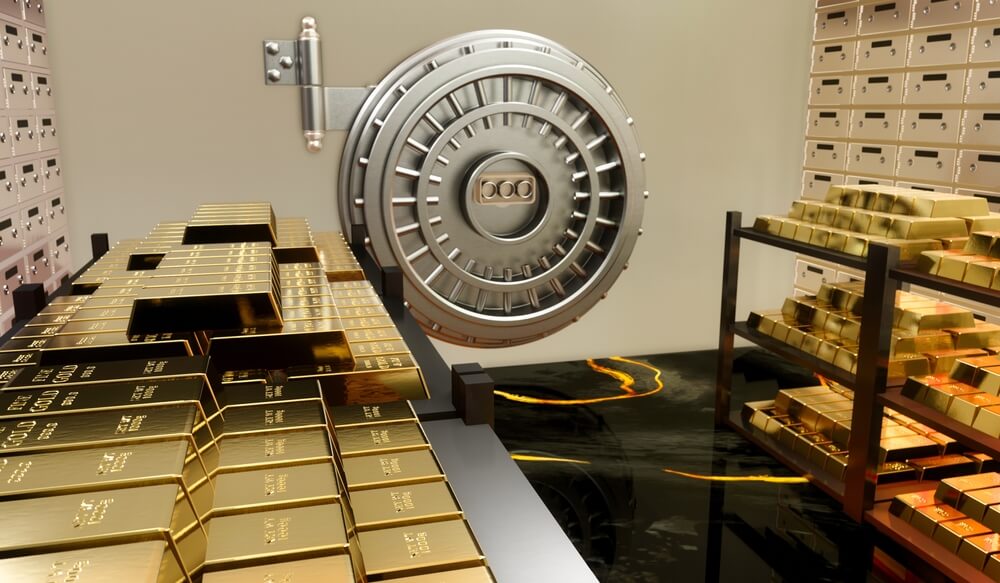
A Complete Guide to Gold IRA Storage Fees
A gold IRA (individual retirement account) storage fee is usually an afterthought. When investing in a precious metals IRA, people typically pay most attention to the custodian (your IRS-approved IRA administrator), their terms and conditions, and the types of gold coins and bars to invest in, among other things. The approach can be attributed to the little knowledge retirement account holders have about storage fees or the tiny realization of those costs' impact on their retirement account returns.
A gold IRA is a great way to invest in gold for post-retirement years. However, unlike traditional IRA accounts, a gold IRA entails physical gold that needs to be stored appropriately. And doing so involves money. If you don’t choose your storage space after much deliberation, you may pay more for the facility, hurting your overall retirement savings.

In this article, we want gold IRA account holders to focus more on the “storage” aspect of holding gold and other precious metals in a gold IRA and the associated costs. To elaborate on it and give a complete picture, we shall focus on the following:
- Short intro to gold IRAs
- A brief overview of gold IRA storage
- Focus on gold IRA depositories
- Gold IRA storage fee
- Answers to some key questions and more
If you want your gold IRA investment to offer good returns, it has to be a cost-efficient setup. You lose the plot if you let the money drain or spend relatively more on maintaining the account rather than investing. Keep reading to tread the potential quagmire precious metals IRA storage costs could be and how to circumvent that by making wise decisions.
Table of Contents
What is a Gold IRA?
A gold IRA (individual retirement account), a self-directed or precious metals IRA, is a retirement account that lets you hold or “store” gold, silver, platinum, and other precious metals as a component of your retirement savings portfolio. A standard IRA allows investing in paper or digital gold but doesn’t permit holding an actual precious metal. Gold IRAs are convenient for those who’d like to buy precious metals as a part of their retirement savings strategy. Click here to learn more about gold IRAs and the top gold IRA companies.
Read more: Is Now a Good Time to Buy Gold?
What is Gold IRA Storage?
The phrase “gold IRA storage” implies the need to store the gold and other precious metals bought under an IRA. As a gold IRA account holder, you are not permitted to keep IRA gold in your home, on private property, or in any other place known to you but not recognized by the IRS (Internal Revenue Service). The gold or other precious metals invested under self-directed IRAs must meet certain quality and purity requirements (set very high) and should be stored in an IRS-approved depository to enjoy tax benefits.
The self-directed IRA account holder can decide on the gold bullion type and the quantity. The IRS has no direct say in that regard. The custodian keeps track of the gold stored in the depository. It is immediately notified when any transaction relating to the storage account is made. Long story short, gold IRA storage allows investors to add gold and other precious metals to their retirement accounts.
What is a Gold IRA Depository?
A precious metals IRA wouldn’t have been a reality if it hadn't been for depositories. The depository is a specialized and secure facility solely for holding gold, silver, platinum, and other physical precious metals. A repository ensures that the gold and other precious metals are stored securely and protected against damage, loss, or theft while complying with IRS regulations and maintaining the tax-benefited status of retirement accounts.
Depositories keep and maintain proper records of the gold and silver stored in the different precious metal accounts while tracking the various accounts' storage type, ownership, and transaction information. Several depositories offer insurance cover to safeguard the stored valuables against potential loss, damage, or theft. Your gold IRA custodian could have a secure storage facility that directly manages your gold or may work with specialized depositories, such as Delaware Depository. Visitors are generally not allowed onto the facility, but you may request a visit to view your holdings.
Precious Metals That Qualify for Gold IRA Storage
Besides gold, other precious metals such as silver, platinum, and palladium bullion are allowed in a gold IRA. Each precious metal must meet specific purity requirements as laid down by the IRS, which may not be identical across the metals. For example, the purity requirement for a silver IRA is marginally relaxed compared to gold. Gold is the precious metal to buy and store under a gold IRA. Silver and platinum follow suit. Palladium is a relatively rare selection for a gold IRA setup and otherwise.
Gold IRA Storage Costs and the Influencing Factors

There’s no standard fee for gold IRA storage. The costs vary across service providers. The metal’s weight and purity, the precious metals’ market value, additional security measures, insurance requirements, etc., influence the price. Let’s discuss them in detail.
Storage Type
Gold IRA storage can be broadly classified as segregated and non-segregated. Segregated storage affords discrete containers or compartments for storing gold, silver, and other precious metals. The separate sections are identified as to whom they belong. Also called “pooled” storage, non-segregated gold IRA storage entails collating precious metals of different investors and storing them in one compartment or storage place. Despite being put together, account records help determine how much a particular investor owns from the gathering.
No prizes for guessing, segregated storage costs more than combined storage. The increased costs are due to the dedicated real estate, individualized records, extra security measures, and increased security protocols provided. Non-segregated storage relies on “economies of scale,” or optimal or maximum use of the available storage space, resulting in cost savings. The security and administrative costs are shared and, therefore, reduced. Opt for non-segregated storage to lower your gold IRA storage costs. It’s equally secure and safe.
Custodian Fees
Your gold IRA company charges or plays a significant part in ascertaining the costs of storing IRA gold. Different custodians have different fee structures with multiple components. Account application fees, yearly maintenance fees, transaction fees, transfer fees, etc., are some of the costs of maintaining account records. The amount of gold stored in the depository and its value are all part of the record maintenance. Some custodians could charge a flat fee or a percentage of the IRA gold’s total value.
And if your custodian offers premium or additional services pertaining to your gold IRA, the costs will only go up. For example, the security and safety measures employed could be more advanced (access controls, modern surveillance systems, etc.). Implementing those security measures entails greater costs, reflecting your storage fees.
Gold Weight and Purity
The precious metal’s purity and weight influence your gold IRA storage fees. The purer the metal, the more valuable it will be, reflecting in its higher storage cost. Similarly, the bigger and heftier the gold coins or bullion, the higher the storage costs they’ll incur as they occupy more resources and space for secure storage.
The Market Value of Gold
Although gold prices don’t move up and down as vehemently as stocks, the prices are not fixed, or there’s still some volatility, which can impact their IRA storage fees. The IRA gold storage costs may move based on the fluctuating gold prices. Higher gold prices will also lead to marginally greater storage costs. As a gold IRA account holder, you should be ready to accept that your storage costs are subject to market volatility and the potential impact on your gold stores.
Although gold’s market value has a say on how much you spend on IRA gold storage costs, the custodian or depository is also a factor in competitive pricing. It’s, therefore, critical to choose the right service provider. Compare the cost structure of different gold IRA companies, whittle the list to a small selection of the best gold IRA companies, and then zero in on a company.
Gold IRA Storage Fees Breakdown
The following is an overview of the different fees you can expect to pay your gold IRA storage provider. For accurate and up-to-date numbers, contact your service provider.
Annual Fees
Depositories charge annual fees for safeguarding gold and other precious metals stored. The costs vary based on the storage space. Most depositories charge a percentage-based fee, usually between 0.5 and 1 percent. The ratio could be higher if the precious metal stored is more high-end. Percentage-based fees are standard since they fetch the repositories more money if the value of the gold stored is high.
Moreover, the changing gold prices bode well for companies that charge by the percent. If you choose a depository through your gold IRA company, the annual fee receipt will be sent to you via your IRA firm. You’ll not have to deal directly with the gold storage firm. The annual fees you pay your gold IRA company include the storage component.
Shipment Fees
Suppose you roll over your existing retirement account or move your precious metals from your current gold IRA to another gold IRA and the new gold IRA firm uses another depository. In that case, your existing storage center must ship your IRA gold to the other company’s premises. For the service provided, the repository will charge you a shipping fee.
The fee comprises costs relating to the special handling, insurance, security measures, etc., needed to transport the precious metals physically. The actual price is based on the stored precious metals’ type, weight, and value. The rollover may also entail fees pertaining to account termination, paperwork, and special requests (if you have any).
Other Fees
Before the yearly fee, the account setup fee enters the discussion. Although the custodian takes the lion’s share of the cost, a small commission may be paid to the depository. Your gold IRA custodian or depository could charge you a wire transfer fee for any amount you wire to the company.
The transfer fee is usually a flat fee determined by the depository. It is a standard fee in the financial space. In the gold IRA context, it helps cover the expenditure relating to the electronic transfer’s processing. In other words, the depository could incur costs from financial intermediaries, such as banks, involved in the transfer process. The fee is mentioned in the documentation establishing your depository account.
If you transact multiple times, the wire transfer fees could considerably inflate your account management costs. When perusing the fee structure of a gold IRA firm or depository, check for the transfer fee component to see how relatively exorbitant or low it is.
Fee Waiver
Note that your storage fees could be waived for the first couple of years or three years based on the gold IRA firm you select. Companies like American Hartford Gold and Orion Metal Exchange run promotions to attract new clients and facilitate cost savings.
How Storage Fees Impact Your Gold IRA Investment Returns
As stated earlier, do not take gold IRA storage fees lightly. If treated as an afterthought, it will shave off a significant portion of your potential IRA investment returns. The impact will vary with the value of the IRA storage fee structure and the stored gold.
The fee will impart a reduced compounding effect. The annual account maintenance fee, in particular, will decrease the total funds available for investment expansion. Over a period, this reduction could create a compounding effect, resulting in lower returns. In other words, if the gold IRA cost denotes a percentage of your investment portfolio’s value yearly, the compounding impact could considerably lower the IRA’s final value over decades.
Then there’s opportunity cost. In simple terms, opportunity cost denotes the value of losing something when opting for one thing over another. In other words, the fees (transaction fees, management fees, etc.) paid for storing IRA gold symbolize an opportunity cost since the money could have been used for other opportunities or invested in assets that may have generated higher returns potentially.
The third aspect to consider is the storage fee's impact on diversification. People invest in gold IRA accounts to diversify their investments and minimize risks more synonymous with stock market volatility and other traditional investments like bonds. If the storage fee exceeds the standard, it could shrink potential diversification advantages, especially if the costs outweigh your gold IRA portfolio’s performance gains.
Because fees play a critical role, use any discounts or promotions your gold IRA company may provide on storage. It’s not unwise to specifically shop for gold IRA firms that offer such write-offs, but ensure that is not the only criteria you have in place to zero in on an IRA firm. And always compare your gold IRA service provider choices.
Give preference to flat fees over percentage-based commissions, especially if you’re investing big. Some companies are also open to negotiations if you’re investing large amounts. So, use your bargaining chops to good effect. Certain custodians also decrease fees for their long-term clients. If you’re looking for a long-term association, select a service provider that acknowledges loyalty and rewards it with lower prices.
Talking about negotiation again, keep a regular eye on industry trends and changing fees. The gold IRA fees offered to you a year or two ago may have been solid then, but the competitor’s current fee structure could be more attractive currently. Bring that development to your gold IRA firm’s attention and negotiate for an even better deal or signal that you may take your business to the other firm. Such low-key “scare” tactics will help if you’ve been a lucrative and hassle-free client for the company.
Best Gold IRA Storage Facilities
The number of gold IRA storage facilities is fewer than gold IRA companies. It’s, therefore, quite common to see a depository catering to the storage requirements of clients of multiple gold IRA companies. For example, Delaware Depository is simultaneously associated with Augusta Precious Metals, Goldco, and Birch Gold Group, to name a few. And because gold IRA account holders do not directly associate with an IRA metals storage firm, choosing the right gold IRA company is akin to selecting the ideal depository.
If you want to know more about the best gold IRA companies, click here. We ranked the companies after assessing multiple aspects and comparing them with competing service providers. We evaluated their consumer advocacy organization ratings (Better Business Bureau, Business Consumer Alliance, etc.), customer reviews, fee structure and cost transparency, the quality of educational materials, website layout and user-friendliness, customer service responsiveness, etc.
Since gold IRA companies usually don’t have exclusive access to a depository’s facility, working with multiple repositories to avoid running out of storage space becomes critical for gold companies. For instance, Goldco and Birch Gold Group partner with Brink’s Global Services besides Delaware Depository. By the way, Goldco has its own storage facility that accommodates non-IRA gold. Noble Gold, too, has a depository, providing its clients with optional storage space for their precious metals.
Read more: Gold IRA Depositories
Conclusion
Gold is undoubtedly an excellent way to diversify an investment or retirement savings portfolio. Although gold can be bought as the physical precious metal or invested in on paper, the feeling of ownership that physical gold possession affords cannot be replicated by holding gold on paper. But owning actual gold is risky due to safety concerns. And then there are multiple ownership costs too. That is why most people looking to buy gold for investment reasons opt for precious metals IRAs.
But then, a gold IRA is not cost or maintenance-free either. Among the multiple fees, the most pertinent or obvious is the storage fee, as discussed above. A shrewd investor will try to minimize the various expenses of owning a gold IRA in different ways possible. Tapping in on the storage cost component is one crucial way. Hopefully, this article educated you on gold IRA storage costs, the contributing factors, and the ways to reduce that financial burden.
To reiterate, reducing your IRA gold storage expenses may seem insignificant now but will benefit you in the long run in the form of greater returns. So, it is in your best interest to pay attention to the aspect and continually assess all factors leading to the cost. And since it’s not a constant number, revisit the prevailing market prices every year or two.
FAQs
Where to store precious metal IRA gold?
The gold you invest in through a precious metals IRA must always be stored in an IRS-approved depository. If held in a private property, the gold will not be considered a part of gold IRA accounts, and due taxes shall apply too. If you don’t want that, do not consider storing your IRA gold in a home safe, safety deposit box, or under your bed.
Is it ideal to let a gold IRA company choose your precious metals depository?
It’s not wrong to let gold IRA companies pick the depository or storage space for your IRA gold since most gold IRA providers have a long and healthy business relationship with such companies. As stated, a precious metals depository is essential to the gold IRA game. And to prevent that aspect from failing or underperforming, the best gold IRA companies stick to working with a few or just one storage service company.
As the precious metals IRA account holder, you are responsible for choosing the right gold IRA company. Pick a reputable gold IRA company to ensure the other aspects are well cared for. If you falter at this stage, it will create a negative domino effect, or the other stakeholders will likely be subpar too. Long story short, allow a gold IRA firm to pick your precious metals dealer or depository only if you’re fully confident of their credibility and have complete trust in their decision-making.
What is the difference between a precious metal IRA custodian and a precious metals depository?
A self-directed IRA custodian administers the IRA and ensures the account complies with IRS regulations. As the name suggests, a depository owns and manages the storage facility that securely keeps your gold and other real-world precious metals. Not to mention, custodian fees and storage costs are two different things contributing to your total precious metals IRA storage costs. Your depository storage cost is generally a part of your custodian fees, which also comprise annual maintenance fees, account setup fees, transaction fees, etc.
What is “checkbook control?”
Checkbook control is a DIY management approach if you are knowledgeable and confident enough to manage your investments. Also called “checkbook IRA,” the method lets you grab greater control over your precious metals investment and have more autonomy in selling precious metals or purchasing precious metals concerning the IRA. You need not get your custodian’s approval to execute transactions relating to the account. That means no custodial delays, reduced custodial fees, and simplified transactions.
Note that checkbook control is not for everyone. It’s unsuitable for inexperienced investors who do not understand a self-directed IRA’s rules and regulations. If employed incorrectly, transactions could get prohibited, and you may incur significant tax penalties, threatening the tax-advantaged status of the IRA. If you’re interested but unsure you can handle it, talk to a tax professional or financial advisor before proceeding.
Do depositories have a minimum investment requirement?
Depositories usually do not set minimum investment requirements themselves. The gold IRA company or custodian usually decides on the matter. Not to mention, the minimum investment threshold varies across gold IRA firms. Some could set a very low minimum investment requirement, while others may not have any in place.


